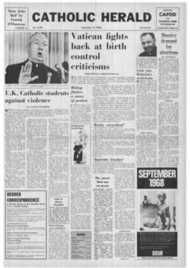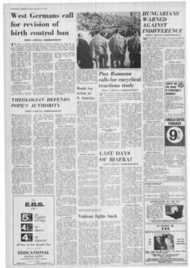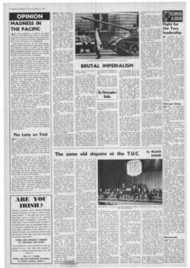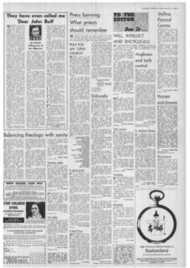Page 6, 13th September 1968
Page 6

Report an error
Noticed an error on this page?If you've noticed an error in this article please click here to report it.
Tags
Share
Related articles
Teeachery, Tragedy And Romance
Falling On The Sword Of Truth
The Splintered Humanists
Autumn Wave Of Ghosts, Ghouls And Poltergeists
Vital Principles For Pastoral Congress
TWO SPLINTERED MIRRORS
TWO new movies hold up not exactly distorting, but slightly splintered mirrors —if not to nature, to topics of the times. Otakar Vavra's Romance For Trumpet ("A" Paris-Pullman) is a lovely pastoral idyll, tender, ironic, sad.
Its peasant pathos is acutely underlined because it comes from a Czechoslovak countryside mercifully unaware of Russian tanks or of anything more barbarous than a local fairground caravan.
The Detective ("X", Carlton) introduces a unit of American cops at work just when Western and Press heads were still buzzing with the supposed excesses of the Chicago police. These cops, however, are shown as no more, if not less, venial than were their British counterparts in The Strange Affair.
A policeman's lot may, I suppose, be expected to involve more "X"-worthy encounters than most. So it would not be much use complaining that Joe Leland's (Frank Sinatra's) story includes some very undesirable, not to say seamy, characters and encounters.
Born and bred a policeman, Leland approaches his job with pride, almost with integrity. compared with the rough and ruthless methods of his colleagues. Not that he is above giving one of them a vicious punch by way of discipline. But his own technique of brain-washing a suspect into confession is comparatively subtle and quiet. He gets the confession and the conviction, which wins his own promotion but is nothing like the end of the case.
It is not even implausible, though it seems bad luck, that the lovely girl (Lee Remick) he marries in spite of her anonymous background proves an uncontrollable nymphomaniac. It is even quite logical that Leland's concentration on the singularly repulsive murder he is called on to solve should lead him to the surprise discovery of a sordid homosexual affair.
The presentation of this seemed to me so grotesque as to be incredible; but the difficult relations between Leland and his wife are quite intelligently handled.
The excesses may be exaggerated but the central portrait of the dedicated policeman is vigorous, neatly directed by Michael Gordon and acted with satisfactory conviction. Sinatra has grown into one of Hollywood's Old DependabIes, acquiring even more authority since his skeletonic features fill out with incipient middle age.
Otakar Vavra, I understand, is an Old Dependable Czech director, though "Romance for Trumpet" is the first of his pictures to be shown here. I thought it the most beautiful small film I have seen since the exquisite Swedish Elvira Madigan; though the Czechoslovak movie is in black and white and more truly simple.
Based on a poem, the elegiac love story framed between an opening and a closing conversation of two of the protagonists. has a true folk-ballad feeling. A country youth, son of a schoolmaster, falls in love (after a lusty bathe in the river with a local wench) with the Columbine who visits the village with her parents' travelling fair—and trumpeter.
The whole setting is perfectly done: the crude, horsedrawn fair, the but in the feathery forest, the tumbling river and romantic fairy-tale castle on a distant mountain top. Yet the essence of the thing is the same very simple humanity which has made such an impression in younger Czech movies.
For the really dominant figure in the youth's story is his gently senile grandfather. The boy has to enter into the dreams in which the old man lives, has to feed him, dress him, put him to bed, with infallible, disciplined tenderness masking any natural impatience.
This is such a rare relationship to see so poignantly realised on the screen, I could not help reflecting that in our more "advanced" civilizations people today are often advised to send such. "senior citizens" into homes.
"Romance For Trumpet" is a film to love. The sad irony is enhanced by seeing it while discussion continues whether to boycott representatives of Czechoslovakia's Russian invaders in the same programme as a short reconstruction of Eisenstein's Bezhin' Meadow ("U" Paris Pullman). As everybody must know by now. Eisenstein's original film of an incident in the collectivisation was first suppressed by the Soviet authorities, then destroyed by German bombs.
The present half-hour picture has been pieced together from tiny clippings. The result is a remarkable demonstration of the technique of giving still pictures the illusion of movement and, so magnificent are Eisenstein's images, an impression of cinematographic sculpture.
blog comments powered by Disqus









